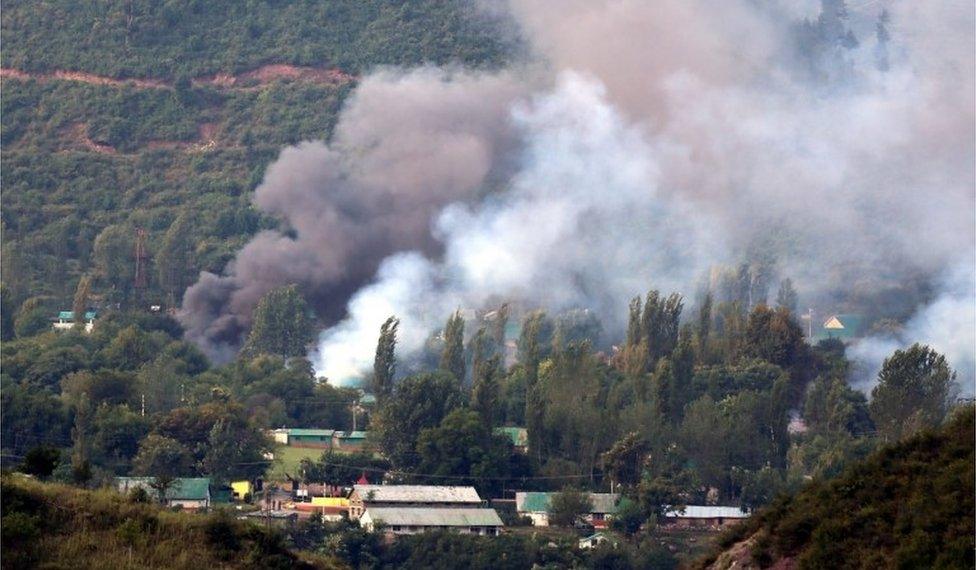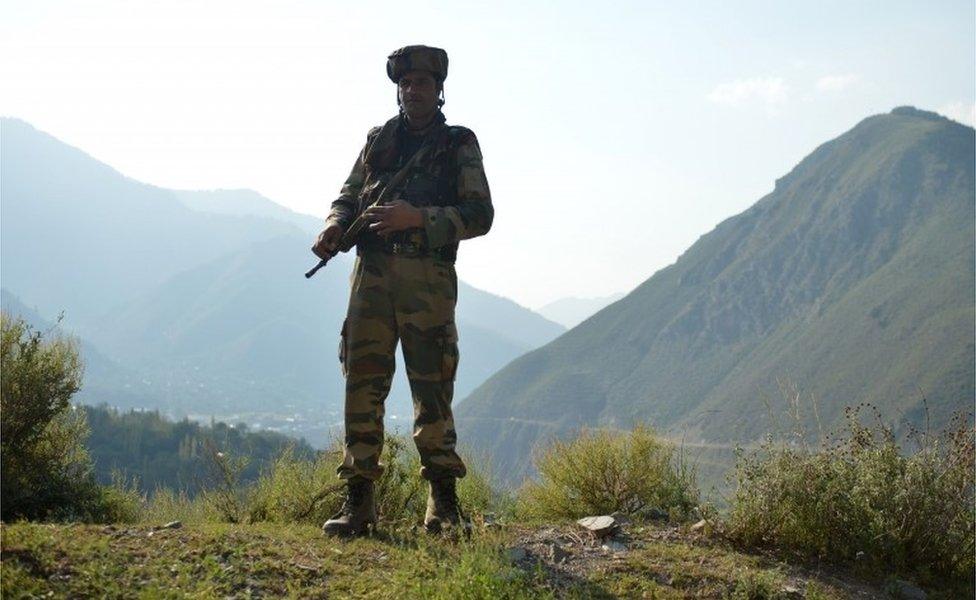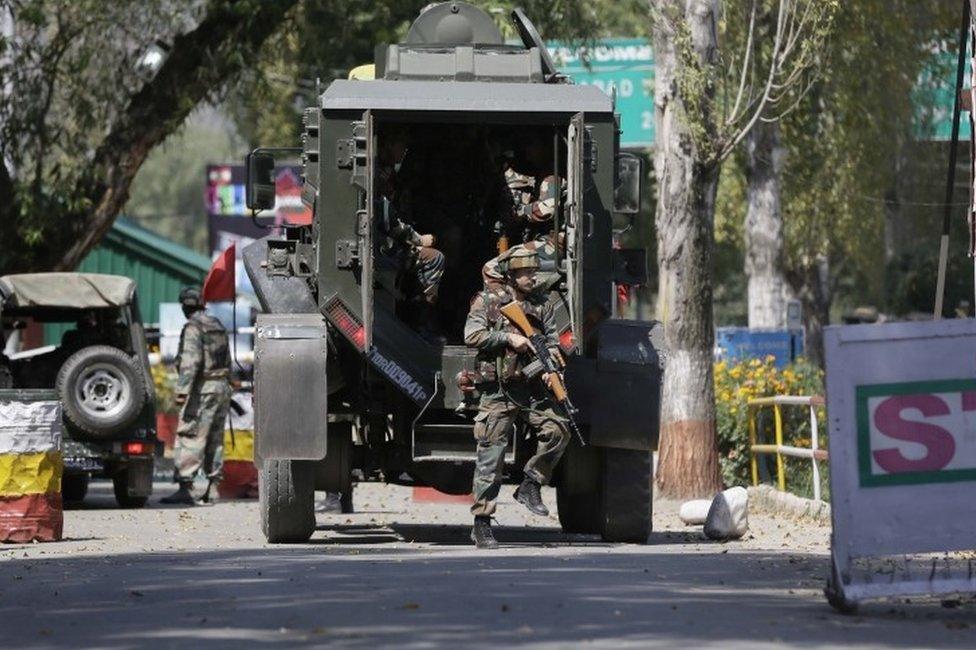Why India needs cool heads after Kashmir attack
- Published

The militants stormed a base in Uri, close to the Line of Control with Pakistan on Sunday
Are India and Pakistan facing a war-like situation after militants attacked an army base in Indian-administered Kashmir on Sunday, killing 18 soldiers? India has blamed the attack on a Pakistan-based group, despite denials from Islamabad.
The headlines said it all next morning: they spoke about Prime Minister Narendra Modi "vowing action" and "weighing response" and the army "asking government to consider cross-border strikes". One headline screamed ominously: "Response will come and swiftly."
Mr Modi, who swept to power in 2014 advocating a tough line on Pakistan, has vowed to punish those behind this "despicable attack". Ram Madhav, a senior leader of the ruling BJP, said the days of India's "so-called strategic restraint are over". Former army officers echo the sentiment, saying India should strike back. The army, according to defence analyst Rahul Bedi, is itching to respond to the latest attack, in a move guaranteed to escalate tensions between nuclear-armed neighbours.
Rhetoric
But the crucial - and more serious - question is whether India has the capability and intelligence to carry out targeted strikes or wage a limited war inside Pakistani territory.
Most experts say that successive governments don't appear to have built these capabilities. There is media chatter on why the air force should carry out surgical air strikes inside Pakistan, but many experts believe it would not be easy as Pakistan has robust air defence systems. There are even doubts whether India has built capabilities for unconventional deterrence.
The problem with Mr Modi's government, according to defence analyst Ajai Shukla, is that it has "escalated the rhetoric [against Pakistan] but has not created military capabilities and planning structure to respond in a more forceful manner [against terror attacks] than the previous government".

India has one of the largest standing armies in the world
Now the government appears to have become a prisoner of its own bluster. "The danger of being trapped in your own rhetoric is that you can be forced into an aggressive response and then be ill-equipped to handle the escalation," says Mr Shukla.
So is India's tradition of so-called "strategic restraint", external against Pakistan the only answer?
For one, the jury is out whether the policy has worked or not. There are no easy answers.
Pratap Bhanu Mehta of Delhi's leading Centre for Policy Research think tank says strategic restraint has served India quite well. "Pakistan will be isolated, except for China, and we should call for financial sanctions," he says. Also, he believes Sunday's attack will put Pakistan on the spot and let the pressure off Kashmir at the UN General Assembly , externalmeeting this week.
"We have actually boxed ourselves into a bit of corner by our public discourse, where the clamour to do something reckless is now great. Otherwise we are winning the long-term battle," says Professor Mehta.
Cold logic
Others like C Christine Fair, defence expert and author of Fight to the End, a scholarly account of Pakistan's army, differ. "If the objective is to deter Pakistan to stop pursuing terror against India it hasn't served the purpose. Does the international community feel any more compelled to take India's side because of its strategic response? Not really," she says.
Others feel that "strategic restraint" masks a morbidly cold logic that India, a country of more than a billion people with one of the largest standing armies in the world, can absorb the deaths of soldiers in terror attacks without any major political upheaval. "India is growing economically, Pakistan is not. So we can sacrifice a couple of hundred people in attacks, without risking a war. That's what the thinking behind strategic restraint is, which nobody really talks about," says an expert.

The recent unrest in Kashmir explained
Indian army’s anger over Kashmir killings
Viewpoint: Living in the shadow of curfew in Kashmir
Viewpoint: Why mass funerals spark violence in Kashmir
Why July's Kashmir Killings could have been avoided
Concern over Kashmir police's pellet guns

So what real options is India left with?
Author Brahma Chellaney says the choice for India, external is not "between persisting with a weak-kneed approach and risking an all-out war".

India has blamed Pakistan for the attacks
"This is a false immoral choice that undermines the credibility of India's nuclear and conventional deterrence and encourages the enemy to sustain aggression. It is also a false argument that India has no choice but to keep battling Pakistan's unconventional war on its own territory," says Mr Chellaney.
So, experts believe, India needs to develop a "wide spectrum of unconventional options" without talking about retributions publicly.
Financial sanctions
They also say Delhi should downgrade diplomatic relations with Islamabad, mount pressure on China, US and Saudi Arabia, Pakistan's "biggest benefactors", lobby for imposing financial sanctions on its rival and pressure the US to openly declare Pakistan as a state which sponsors terror. It should also stop lurching between "impetuous friendship and hostility" with Pakistan, says one analyst, alluding to Mr Modi's surprise visit to Pakistan last year to meet his Pakistani counterpart Nawaz Sharif on the latter's birthday followed by a quick downslide in bilateral ties.
Most experts insist India should also stay on the message: that it has been a victim of cross-border terrorism. Raising the issue of Balochistan at the United Nations, external, Dr Fair believes, doesn't serve India well because it makes India a participant in the bickering over the region. "India's concern and focus should be on Pakistan's terror, not Balochistan. It should stay on the message and persuade the international community on the veracity of the message," she says.
South Asia expert Stephen Cohen says the conflict between India and Pakistan is one of the few in the world that are truly intractable and could go on indefinitely. "This is a conflict that Pakistan cannot win, and India cannot lose," he says. Many experts think bluster and rhetoric is no substitute for cool-headed, clear-eyed policy and considered action, and can only erode India's credibility.